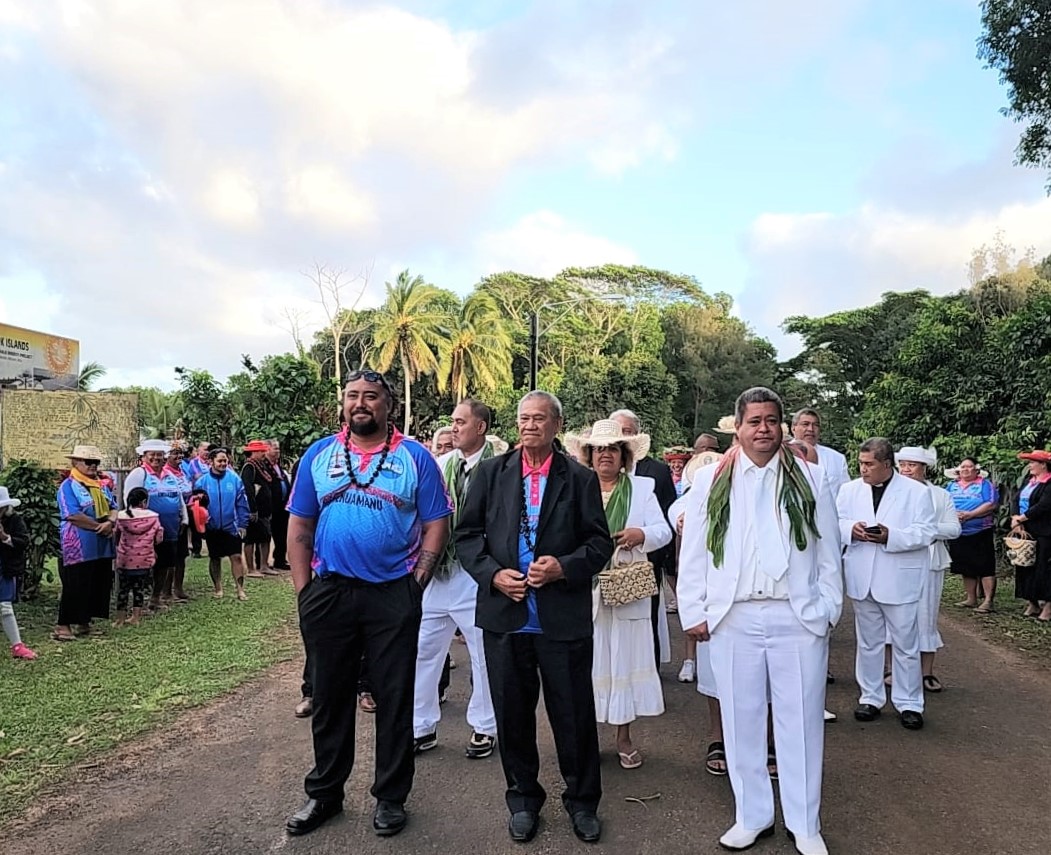Atiu celebrates Gospel Bicentennial
Friday 21 July 2023 | Written by Supplied | Published in Church Talk, Features

Te Putokotoko o Tamatoa Ariki - Kiikoro- i-te-Maru-o-te-Ao: Arerau Maao Jnr , Tamatoa Teao Ariki and Rongomatane Nicholas Paenui Te-iti Ariki prepare for the start of the parade to Nootu. TUAINE UNUIA/23071918
The island of Atiu this week kicked off Nga Pu Toru’s ‘Te Arikianga o te Evangelia – Arrival of the Gospel Bicentennial’ celebrations.
The event held on Wednesday marked the arrival of Christianity two centuries ago on July 19, 1823.
According to historian and author Howard Henry, Reverend John Williams and the Mission Ship made their way to Atiu in mid-July 1823 after an attempt to take the Gospel to the island in April the previous year.
Two “Native Teachers” were left on Atiu, after an Ariki had given assurance that no harm would come to them. Rev Williams wondered if these two men had succeeded with their missionary endeavours on Atiu to the same extent that Papehia and Vahapata had achieved on Aitutaki in 1821.
The Mission Ship and her crew were met by Rongomatane Ariki who was explained the purpose of their visit.
“Rongomatane Ariki was told that two teachers from Raiatea had first landed on Aitutaki to introduce the Gospel and Christianity to the people of that island. He said there were two teachers on board who are willing to go ashore and teach the people of Atiu all about the Gospel, Jesus Christ and Christianity,” writes Henry.
However, Rev Williams soon became somewhat disappointed after he discovered that his two “Native Teachers” left at Atiu the previous year had been stripped of their possessions and were living a destitute existence on an isolated part of the island.
As a result of this, he concluded that they had to leave the island.
According to Henry, Rongomatane Ariki remained on board that night and neither he nor any of the visitors apparently got any sleep.
“They spent the whole night discussing matters relating to Christianity, the Gospel, Jesus Christ and the Spirit of the Lord.
“Rongomatane Ariki was told that by embracing the Gospel, his people would also be embracing a whole new way of life. He was told that once his people had accepted Christianity, there would be no more wars, no more fighting and certainly no more killing.
“The Ariki of Atiu was told that this was because God was a “Loving God” and that Christians did not fight or cause harm to each other. The Ariki was told that everyone would live in peace and harmony because that was the Christian way as to how people lived their lives.
“Rongomatane Ariki was also told that while Jesus Christ was the son of God, and had been a man in the living form, his father, being God, was a spirit. And that “Spirit of God” was everywhere in this world, at all times. His spirit would never fade. His spirit would never die.”
Rongomatane Ariki’s traditional gods had been very good to him over recent years including the guiding of he and his warriors to the conquest over the people of nearby Mitiaro (or Miti’aro) and Mauke (or Ma’uke).
“But it had quickly become obvious to Rongomatane Ariki, that the European God was far more powerful, generous and “rich-with-giving” to its believers than his traditional gods had ever been,” writes Henry.
The next day Rev Williams invited Rongomatane Ariki to attend their morning church service on board the Mission Ship as an observer. The Ariki accepted this invitation and so the Missionary went out of his way to deliver a sermon that was designed specifically for the ears of Rongomatane Ariki and his “spiritual consumption”.
“In addition to the sermon of Rev Williams and prayers from Rev Robert Bourne, there was also the singing of hymns by all those on board the Mission Ship. The power, passion and emotion displayed by those singing these hymns was of the kind that Rongomatane Ariki had never heard before.
“In addition to that, everyone appeared so happy, so joyful and obviously really enjoying this occasion. The Ariki of Atiu clearly saw the emotion and heartfelt commitment by those who sang these hymns that it is impossible not to think that the ‘Spirit of the Christian Faith’ did not reach through to touch the heart of Rongomatane Ariki.
“Then there was the ‘Lord’s Prayer’ . . . that too had a significant effect on the Ariki.
“As a result of that church service, Rongomatane Ariki made up his mind that he wanted to change his ‘Religious Allegiance’ to that of the Christian faith. He told the Missionary that he wanted to abandon his traditional gods and was willing to embrace Christianity.”
Rongomatane Ariki also helped introduce Christianity to the islands of Mitiaro and Mauke. Mitiaro will celebrate their Te Arikianga o te Evangelia on Saturday and Mauke on Sunday.









































